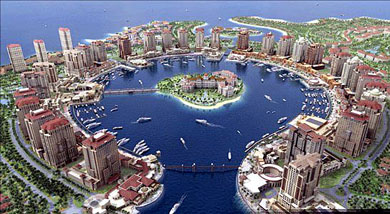GERTZ:A report by a British diplomat said Doha has been told that it would be the first Gulf Cooperation Council state to come under Iranian attack in any regional war. The diplomat cited Qatar's hosting of the air operation command for U.S. Central Command.
At the same time, Qatar was said to have pledged to finance a major energy project in Iran.

'Qatar has been told it would be attacked first should it collude in a U.S. attack on Iran.' internationalpropertyinvestment.com
Ancient tradition: to buy off the barbariansIranian officials said the Qatar National Bank would invest nearly $600 million to develop Iran's Esfandiar offshore crude oil field.
"In addition to their belief that Iran wants to dominate the region, the GCC states have specific security concerns, including the safety of offshore oil and gas installations: Qatar has been told it would be attacked first should it collude in a U.S. attack on Iran," the report, "Iran: Breaking the Nuclear Deadlock," said.
Collude? That's pretty loose. A snicker? A comment in the bathroom?
The report, published by the London-based Chatam House, said other GCC states were concerned over the Iranian threat. Author Richard Dalton, British former ambassador to Teheran, said Gulf Arab countries fear Iranian destabilization through their Shi'ite communities.
Can anyone say YEMEN and Houthi?
"Oman must avoid a military clash with Iran in the Straits of Hormuz," the report said. "Bahrain is nervous about possible Iranian irredentism.
Bahrain, Kuwait and Saudi Arabia have concerns about Iranian influence amongst their own Shia populations. The UAE [United Arab Emirates] retains a territorial dispute with Iran over the islands of Abu Musa and the Tunbs."
The report said Qatar and other GCC states would likely come under attack should Israel or the United States seek to destroy Iran's nuclear facilities. Dalton said GCC states have decided to embark on a policy of persuasion, containment and cooptation.
"All the GCC states remain very concerned about the possibility of a nuclear-armed Iran, and have been seeking to prevent this by indirect signals, and by trying, with increasing frustration, to persuade the EU [European Union] to involve them seriously in attempts to engage Iran," the report said. "None of the above seem to be effective, and the rulers are facing a stark dilemma. Yet, however worried they may be, none wants a military solution -- they feel too vulnerable to the spillover, both from direct Iranian counterattack and through regional and domestic destabilization."
Meanwhile, Iranian Offshore Oil Co. said Qatar would provide all of the funding for Esfandiar, to be developed by a contractor from Malaysia.
"According to Iranian regulations related to the finance of contracts in the oil industry, 85 percent of primary investment in finance projects should be provided by investors," Hussein Jafari, financial director of the Iranian state-owned company, said on Jan. 5. "But Qatar's National Bank is to provide 100 percent of the funding."
Qatar has not confirmed the Iranian assertion regarding Esfandiar. The oil field is one of two shared by Iran and Saudi Arabia.
